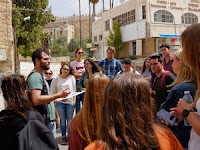...With the establishment of the State of Israel in Eretz Yisrael, the Jewish people were able to restore their ancestral language to everyday use, to reunite the diverse Jewish subcultures that developed in the long period of diaspora, and to redevelop a non-diasporic culture: a culture of a people living in their own land.
Victor Rosenthal..
Abu Yehuda..
03 August '19..
Link:
http://abuyehuda.com/2019/08/weve-always-been-here-the-historical-right-of-the-jewish-people-to-the-land-of-israel/
I often talk about
the Jewish people’s historical right to Eretz Yisrael, the Land of Israel, in addition to our legal and moral rights. What do I mean by that? First we need to understand the concept of a distinct “people.”
Mahmoud Abbas has said numerous times that the Jews are not a people; being Jewish is only a religion. He could not be more wrong: the Jewish people are the paradigm case of a
people. In other words,
if you want to know what a “people” is, look at the Jews.
More analytically, a “people” is a collection of individuals who have certain characteristics in common. Not every individual in the group will have all of them, but the more of them that they have, the more likely it is that they will be considered a member of that people. They are:
1. A common geographical origin and a connection to their aboriginal home.
2. A shared genetic heritage.
3. A unique ancestral language.
4. A unique religion.
5. A shared culture.
6. A shared historical experience.
7. Self-identification as members of a people.
The Jewish people originated in
Eretz Yisrael. They generally married within the group, so DNA tests today display a high degree of genetic similarity. They maintained a familiarity with their ancient Hebrew language, even when they spoke other languages as a result of their dispersal. Their religion, Judaism, has changed to some extent over the centuries, but their holy book, the Torah, has remained essentially the same for several thousand years. Their dispersal created Jewish subcultures, but all of them retained some connections to their original culture, even as they drew apart. The historical experience of Jews in the diaspora was remarkably similar, whether they were in Europe, Africa, or the Middle East – they were outsiders, sometimes persecuted or expelled, sometimes living peacefully, but always marked as different and almost always as second-class citizens. Finally, all of them everywhere strongly felt themselves to be members of the Jewish people, tied to
Eretz Yisrael, to which they prayed to return.
Individuals can enter or leave a people, usually by marrying in or out and adopting the religion, language, and culture of their partner. Peoples change over time. Sometimes a people is so diluted that that it is extinguished, absorbed by the peoples around it. Such is the case with many cultures of antiquity. Where are our once deadly enemies, the Philistines, today? (No, the Palestinian Arabs are not descended from them). But the Jewish people maintained its genetic distinctness, its religion, its language, and much of its culture in diaspora for millennia.
With the establishment of the State of Israel in
Eretz Yisrael, the Jewish people were able to restore their ancestral language to everyday use, to reunite the diverse Jewish subcultures that developed in the long period of diaspora, and to redevelop a non-diasporic culture: a culture of a people living in their own land.




















